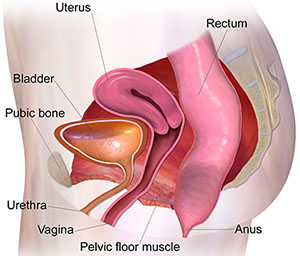Is My Pubococcygeus Muscle Dysfunction?
Are you someone who is suffering from weakened pubococcygeus muscles? This article will explain some things that cause weakened pelvic floor muscles. Besides, how to strengthen them. Weakened pelvic floor muscles (pubococcygeus muscle) can become weak and loose over time. Events such as, childbirth and pregnancy are common problems for most women. (you’re not alone.) For men, weak pelvic floor muscles can be caused by constipation, heavy lifting and prostate surgery. As a rule, pelvic floor dysfunction affects both men and women. [1]
Therefore, for some individuals, the pubococcygeus muscle can become too tight. Although these cases are rare, this can be a distressing issue. Especially for women. Causes can be complex. Those who are experiencing severe pain, a pelvic floor physiotherapist is recommended. However, in almost all cases, it is entirely possible to train your pubococcygeus muscle and correct the problem. One of the best ways for women is VagaCare®’s vaginal weight exercise system.
What Causes Pelvic Floor Dysfunction?
- Childbirth and Pregnancy in Women: By the way, data suggests that health problems can happen during pregnancy. Compare to, after childbirth. Instrumental births, multiple births or large babies create a highest risk.
- Toilet Straining: Over time, repeated or chronic straining while on the toilet can lead to pelvic floor dysfunctions. Generally, associated with constipation that affects the rectal lining and the pubococcygeus muscle in the vagina. Causes of constipation should be addressed along with learning good toilet habits to avoid straining.
- Heavy Lifting: can lead to prolapse and create pressure on the pubococcygeus muscle. Men and women who are in professions like construction or nursing are particular at risk. Especially, individuals engaged in weight training can also be at risk.
- Chronic Coughing: Individuals who have an ongoing chronic cough like a smoker’s cough, bronchitis, and asthma should be concerned. [2] These symptoms are serious in nature and can put individuals at risk of prolapse and incontinence.
- High Impact Sports: Most important, participating in sports like football, basketball, and rugby can put individuals at a higher risk of leaking urine. This is a factor for women who play high impact sports and be a cause for pelvic floor dysfunction.
- Obesity: As a rule, being obese places greater strain on the pubococcygeus muscle and increases chances of incontinence.
- Age: When individuals age, the pubococcygeus muscle will get weaker. Vaginal weights and kegel exercises can help those who suffer from weakened pelvic floor muscles at any age.
What Makes the Pubococcygeus Muscle too Tight?
This can be a complex issue. Sometimes the pubococcygeus muscle, fails to relax properly. For instance, causing the bowel and bladder not to discharge properly. Pain is usually the reason why the pubococcygeus muscle gets too tight. Because the pubococcygeus muscle is hidden from view, the issue often times goes undiagnosed. If you are someone who is suffering from incontinence caused by weakened pelvic floor muscles and need help? Using a pelvic floor exerciser from VagaCare® can effectively assist building the pelvic floor. Consequently, this condition affects about 50 percent of all women who have experienced childbirth. [3]
How to Correct Pelvic Floor Dysfunction
Physical therapist and doctors alike, both recommend the use of vaginal weights to strengthen the pubococcygeus muscle. Pelvic floor dysfunction can also play a vital role for a healthier sex life. Hence, millions of women worldwide suffer with self-confidence issues about the size of their vagina. Thereby, hearing that you are “too loose” down there, can have a huge impact on your self-confidence. This makes most women cautious about having sex; therefore, causing problems in a relationship with their significant other. To summarize, if you suffer from pelvic floor dysfunction, VagaCare® exercise system is available for help.
References:
- Boyadzhyan, L; Raz, S.; Raman, S. (2008). “Role of dynamic and static MR imaging of surgical pelvic floor dysfunction”. RadioGraphics. 28(4): 949–67.
- Retrieved from: https://simonfoundation.org/chronic-cough-and-asthma/ August 21, 2018
- Hagen S, Stark D (2011). “Conservative management and prevention of pelvic organ prolapse in women”. Cochrane Database Syst Rev. 12 (12): CD003882.
Discreet Shipping
From Venice Florida
Customer Support
support @ vagacare.com
Mon - Fri: 9:00 - 5:00
941-445-6005 | Online 24/7
Site Links
Account Links
Why Shop With Us
* 100% Discreet Shipping
* Secure Shopping
* Trusted for 12 Years
* No Catalogs Mailed to Your Home
* Real People That Care About You
Call: 941.445.6005
© COPYRIGHT 2006-2018 VagaCare® an Affiliate of Medgo® LLC. ALL RIGHTS RESERVED.
Our Healthy products are not intended to diagnose, cure or prevent any disease.


